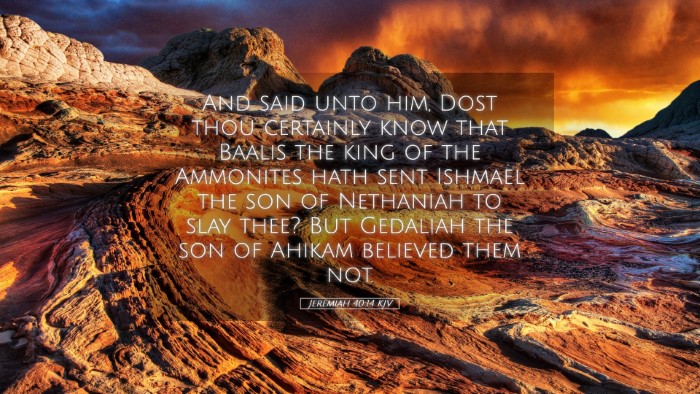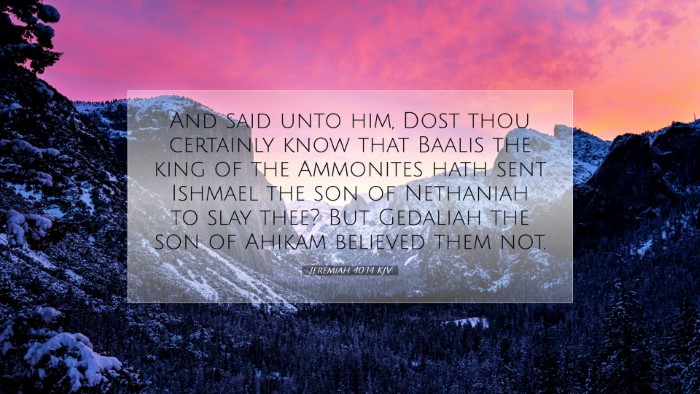Commentary on Jeremiah 40:14
Jeremiah 40:14 states, “And said unto him, Dost thou not know that Baalis the king of the Ammonites hath sent Ishmael the son of Nethaniah to slay thee? But Gedaliah the son of Ahikam feared not the words of Johanan the son of Kareah.” This verse is pivotal within the context of the post-exilic community in Judea, addressing the themes of leadership, trust, and the perilous political environment that surrounds the remnants of Israel after the Babylonian captivity.
Contextual Background
The Book of Jeremiah offers extensive insights into the socio-political and spiritual dilemmas faced by the Israelites during the transition from exile back to their homeland. By the time of this verse, Gedaliah has been appointed governor over the cities of Judah, demonstrating a glimmer of hope for restored leadership and governance. This commentary synthesizes insights from various public domain sources to deepen our understanding of this specific passage.
Key Figures in the Verse
-
Gedaliah: Appointed by Nebuchadnezzar, he embodies the potential for peace and reconciliation amidst chaos. His leadership is characterized by a level of faith and determination.
-
Johanan: A military leader who displays caution and concern for Gedaliah's safety. His warning underscores the precariousness of the political situation in Judea.
-
Ishmael son of Nethaniah: An agent of treachery, representing the threats lurking within the returned community, illustrating the internal divisions plaguing post-exilic Israel.
Thematic Insights
-
Trust and Leadership: Gedaliah's character exemplifies trust in God and in the Edict of Nebuchadnezzar. According to Matthew Henry, Gedaliah's faith is admirable as he strives to lead and maintain stability despite severe warnings of impending danger.
-
The Influence of External Forces: The mention of the king of the Ammonites reveals the geopolitical landscape that the Israelites navigate. Adam Clarke notes that external threats remain a consistent reality for the Israelites, stressing the need for vigilance and spiritual discernment.
-
Fear versus Faith: Gedaliah's refusal to fear the potential threat from Ishmael reflects a larger spiritual lesson on faith amid adversity. Albert Barnes comments on Gedaliah’s faith as a lesson for believers to anchor their trust in God rather than be swayed by fear.
Spiritual Lessons
From this verse, several spiritual lessons emerge that are relevant for pastors, theologians, and students alike:
-
The Role of Divine Providence: The passage highlights God’s providential care over His people. Gedaliah’s leadership serves as a reminder that God often works through apparently weak instruments—leading the faithful into new seasons.
-
Discernment in Leadership: Leaders must possess discernment when confronted with counsel and warnings. Johanan’s intervention, though borne out of concern, also encourages leaders to balance wisdom and fear with faith.
-
Resistance against Evil: The plot against Gedaliah illustrates the need for vigilance against those who might seek to undermine God’s work. It reminds the community to stand firm against treachery and to uphold righteousness.
Conclusion
Jeremiah 40:14 encapsulates a profound moment in Israel’s history, where leadership, fear, and external threats converge. The interpretations provided by Matthew Henry, Adam Clarke, and Albert Barnes serve to enhance our understanding of this event and its implications for the faith community today. By observing Gedaliah’s courage, Johanan’s concern, and Ishmael’s treachery, modern readers can mine rich lessons about vigilance, faith, and the dynamics of leadership within the church and broader society. In this era of uncertainty, the call remains for leaders and believers alike to uphold trust in God amidst challenges, embodying faith over fear in their respective contexts.


